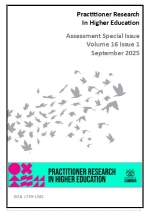The impact of a peer-feedback intervention on the attitudes and beliefs of first-year Social Care students in Ireland
##plugins.themes.bootstrap3.article.main##
Abstract
One way of actively engaging students with the feedback process and enhancing feedback literacy is through peer-feedback. However, there is little research to date in Ireland on undergraduate students’ beliefs and attitudes towards peer-feedback. All participants completed a validated questionnaire, ‘Beliefs about Peer-feedback Questionnaire’, to explore their beliefs about and attitudes towards peer-feedback, before and after a peer-feedback intervention. Both before and after the intervention, approximately 80% of respondents valued peer-feedback as an instructional method and as an important skill, while 87% of these first-year students engaged with the peer-feedback intervention. A clear implication for teaching is that peer-feedback can and should be further utilised to address the feedback problem in Ireland. Prior to the intervention, approximately 60% of students were confident in their ability to generate peer-feedback while approximately 80% were confident in their peers’ ability to generate feedback. The intervention changed these attitudes with confidence in their own ability growing slightly (10%) and confidence in their peers’ ability decreasing substantially (by 20%). Developing students’ evaluative judgement and the capacity to generate high-quality feedback through training and repeated opportunities to practise is a key recommendation. A longitudinal study, exploring beliefs and confidence with cumulative experiences over time, is also highly recommended.
##plugins.themes.bootstrap3.article.details##
Proposed Policy for Journals That Offer Delayed Open Access
Authors who publish with this journal agree to the following terms:
- Authors retain copyright and grant the journal right of first publication, with the work for one year after publication simultaneously licensed under a Creative Commons Attribution License that allows others to share the work with an acknowledgement of the work's authorship and initial publication in this journal.
- Authors are able to enter into separate, additional contractual arrangements for the non-exclusive distribution of the journal's published version of the work (e.g., post it to an institutional repository or publish it in a book), with an acknowledgement of its initial publication in this journal.
- Authors are permitted and encouraged to post their work online (e.g., in institutional repositories or on their website) prior to and during the submission process, as it can lead to productive exchanges, as well as earlier and greater citation of published work (See The Effect of Open Access).

